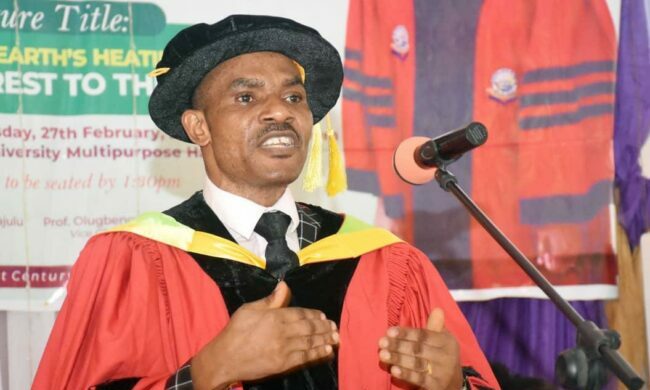A Professor of Silviculture and Plant Biotechnology, Professor Alaba Gbadamosi, has raised the alarm that the earth has been brought to the brink of unmitigated disaster as a result of deforestation.
The Don said the destruction of the earth’s natural habitat through unchecked human activities will continue to destroy the global ecosystem.
Gbadamosi noted that the destruction has brought the earth to the brink of unmitigated disaster that could lead to disastrous consequences for the globe and its inhabitants.
Speaking during the 22nd Inaugural Lecture at Adekunle Ajasin University, Akungba Akoko, titled “The Earth’s Heating Mantle: Forest to the Rescue,” maintained that unless something serious is done urgently to stop deforestation, disaster is imminent in the country.
Gbadamosi emphasised the critical state of the global ecosystem, highlighting the imminent threat of unmitigated disaster unless immediate and concerted actions are taken to curb deforestation.
The lecturer, while drawing attention to the interconnectedness of environmental health and global well-being, asserted that building a healthy economy or nation would be impossible on an unhealthy planet.
He underlined that environmental degradation, particularly through deforestation, contributes significantly to climate change, biodiversity loss, and the emergence of new diseases.
The lecturer, who is also the Dean of the Institutions Faculty of Agriculture, stressed that unless there are collaborative efforts among relevant agencies and stakeholders, along with a more rational use of natural resources, the alarming trend will persist.
The consequences of unchecked destruction of the earth’s forests and biodiversity, according to the Inaugural Lecturer, include global warming leading to flooding that threatens coastal cities, a rise in the earth’s temperature, and disastrous changes in climate and weather conditions resulting in drought and famine.
He, however, proposed immediate measures to address the looming crises, saying these include a halt to deforestation activities, an increase in small-scale forest holdings and community forests, the resuscitation of efficient forestry services, sustainable yield models, adequate funding, the establishment of ecological zones, and public enlightenment on the dangers of indiscriminate bush burning.
He emphasised the crucial role of forests and trees in addressing environmental challenges, advocating for the maintenance and restoration of degraded lands, the expansion of agroforestry, and the adoption of sustainable forest use practices, while highlighting the need to address the poverty index in tropical nations with vast forest estates.
He stated that “forests and trees can play crucial roles in addressing these crises and moving towards sustainable economies; therefore, there must be an urgent halt to deforestation activities, maintenance of forests, restoration of degraded lands, expansion of agroforestry, and embracing sustainable use of forests.
“The poverty index in tropical nations with vast forest estates should be addressed; we cannot expect too much from poor and hungry people as regards the preservation of biodiversity and conservation of the forests.”
He also identified the drying up of river basins in certain areas, as seen in the case of Lake Chad River Basin, caused by the unreasonable use of the environment, as one of the factors fueling the farmers/herders clashes in Nigeria.
He said, “While there may seem to be an expansionist scheme in the herders/farmers clashes in Nigeria, the fact remains that the grazing and water resources available for nomadic cattle rearing have been limited by climate change and the business interests of herders have been threatened, hence the continued conflicts and disagreements since the early 2000s.”
Gbadamosi urged governments at all levels to revive moribund paper mills across Nigeria, saying, “Governments at the national and state levels should form a synergy towards reviving the moribund paper mills scattered all over Nigeria and stop the shameful capital flight in the importation of pulp and paper products.”
The Vice-Chancellor, Prof. Olugbenga Ige, emphasised the importance of inaugural lectures as platforms for researchers to share the benefits of their work and offer recommendations for addressing current challenges.
He commended the inaugural lecturer for his significant contributions to the university and society at large, both in academic and administrative roles.
ALSO READ THESE TOP STORIES FROM TheWitness







